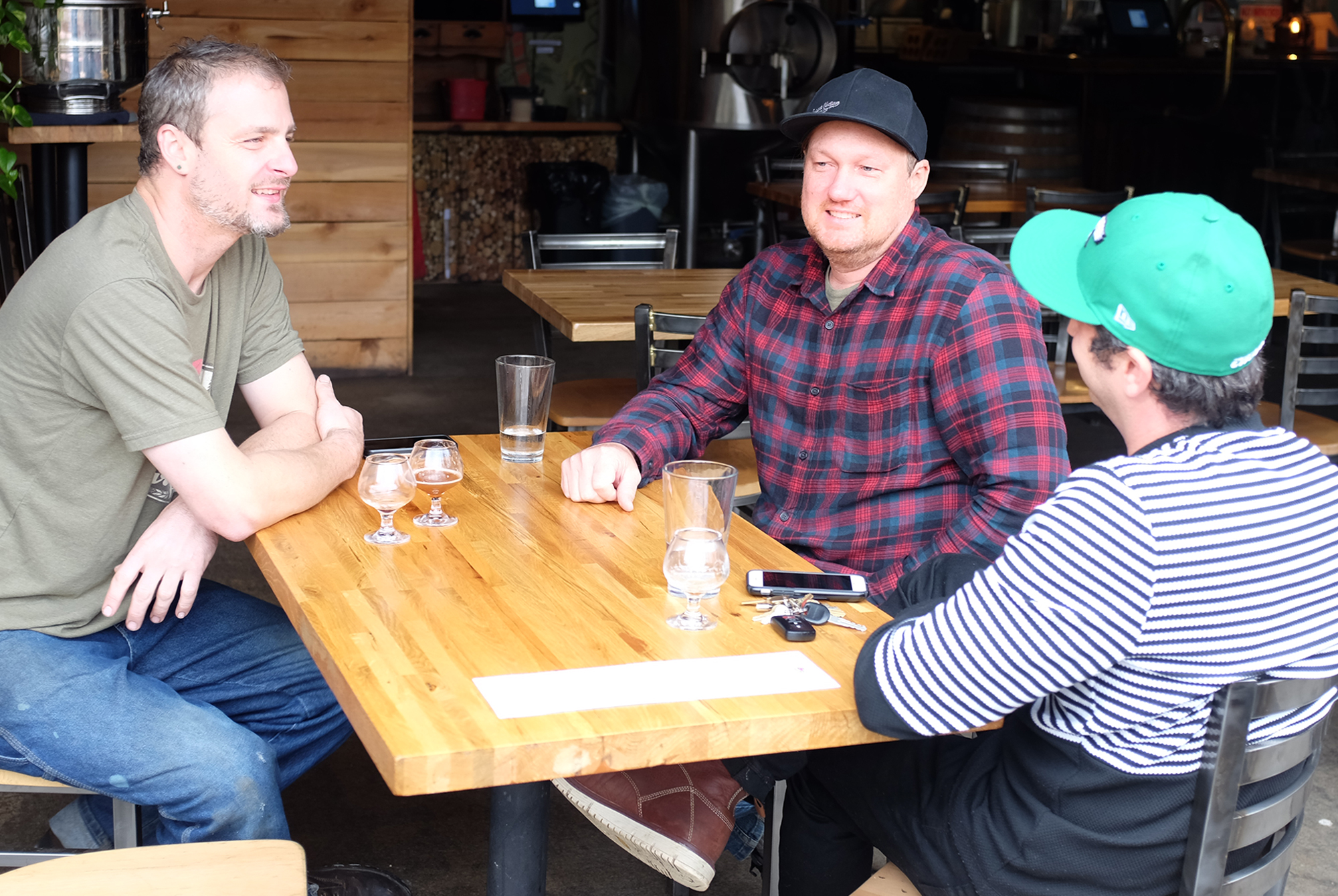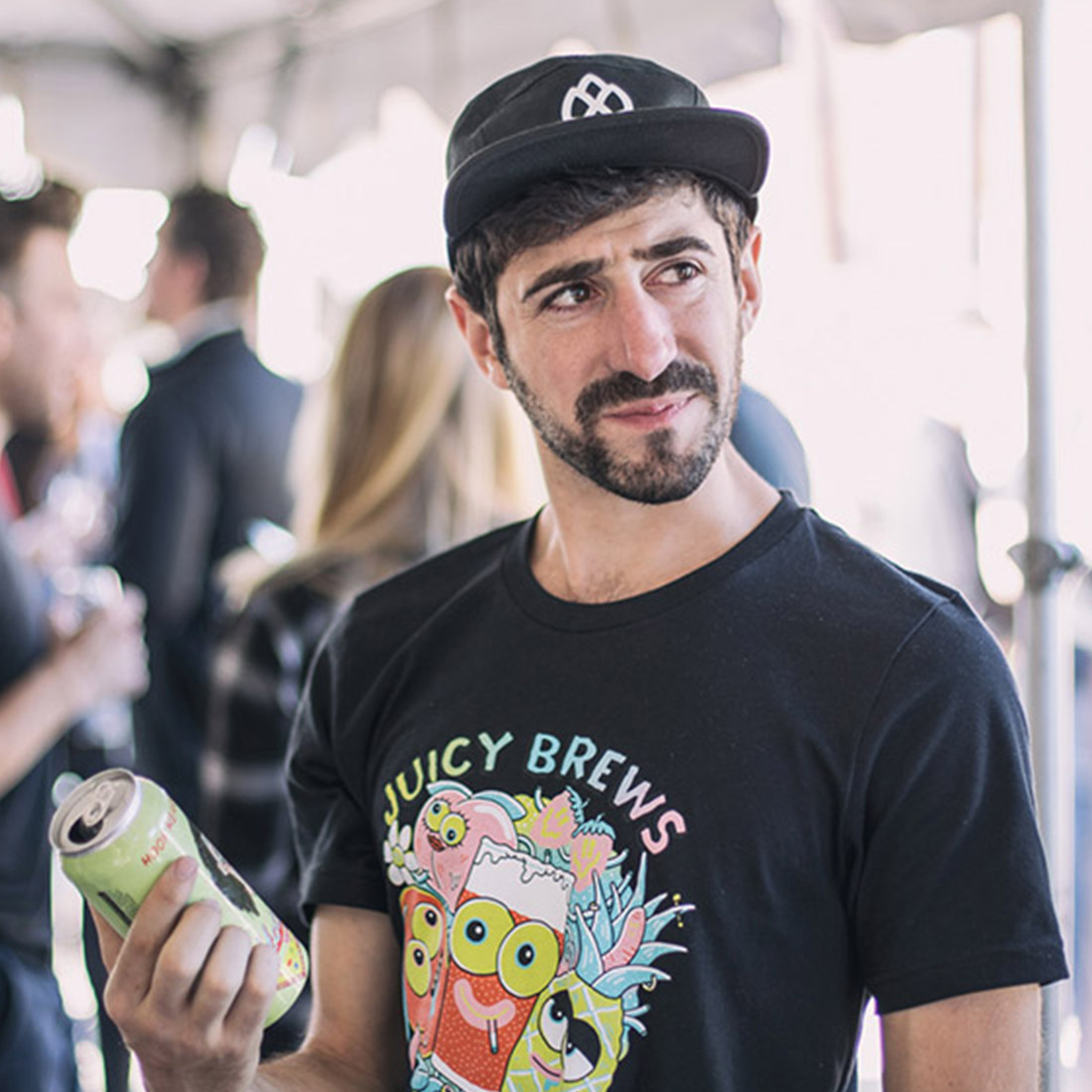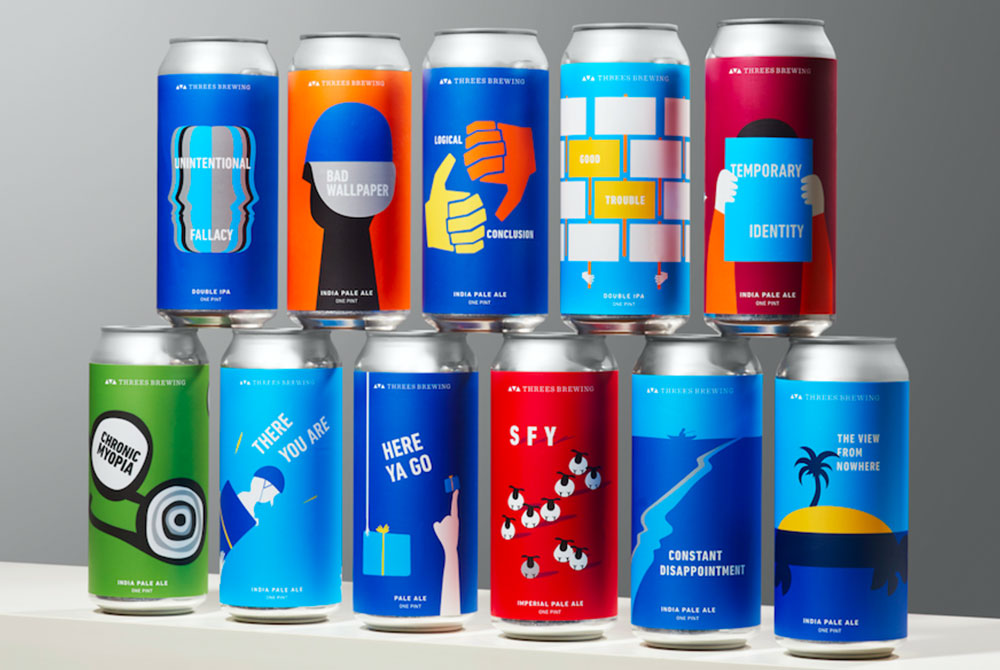Shop
How to Make a Stout Taste Like Pancakes: An Interview with Great Notion
Three musketeers.
Let me start by saying that I’ve been wanting to visit Great Notion for a while. A few years ago, I tried their Double Stack Imperial Stout and was amazed to find it tasted exactly like pancakes. Then I tried their Blueberry Muffin sour and that was it. I had dreams about wandering the streets of Portland, Oregon, which I’d heard looked a little like my beloved hometown of Pittsburgh, Pennsylvania, and walking into their brewpub for a culinary adventure. Their beers reminded me of that scene from Willy Wonka & the Chocolate Factory: “It’s amazing! Tomato soup, I can feel it running down my throat! It’s changing… roast beef and baked potato. Crispy skin and butter! Blueberry pie and ice cream!” Only–in my dreams–I never turned into a muffin.
I met founders James Dugan, Andy Miller, and Paul Reiter at their Alberta Street Brewpub, which they opened on January 1st, 2016. Each has a role to play; they go by the Artist, Scientist, and Businessman, respectively. However, creativity and passion for good food and beer exude from all three. Great Notion does things differently. To give you an example, the day before our interview, I received a phone call from an unknown Philadelphia number — it was Reiter, asking me if before our interview, he could have the opportunity to interview me.
I’m happy to say that my visit to Great Notion didn’t disappoint. The best part? Great Notion is in the process of opening a new 20,000 square foot production facility in Northwest Portland, meaning that their terrific and coveted beer will become more available.
Kenny Gould: Let’s get right into this because we’ve only got 10 minutes.
James Dugan: We’ve only got 10 minutes?
KG: No, we don’t have a time limit. I’m just trying to be respectful of your time.
JD: You know what? There’s not a lot going on today.
Andy Miller: James doesn’t really do anything, anyways.
JD: Yeah, I just sit back there.
KG: How did the three of you meet?
AM: The first time I met James, I was out walking my baby. He was homebrewing and I went up and introduced myself. He wasn’t very impressed that I homebrewed as well. Over that year, we started chatting a bit. I think it was my son’s first birthday; I had a homebrew on tap and I invited him over. That was kind of the first day we really hung and shared some beer.
Paul Reiter: You didn’t tell him that we’re neighbors.
AM: Oh yeah. All three of us are neighbors. We live on the same street.
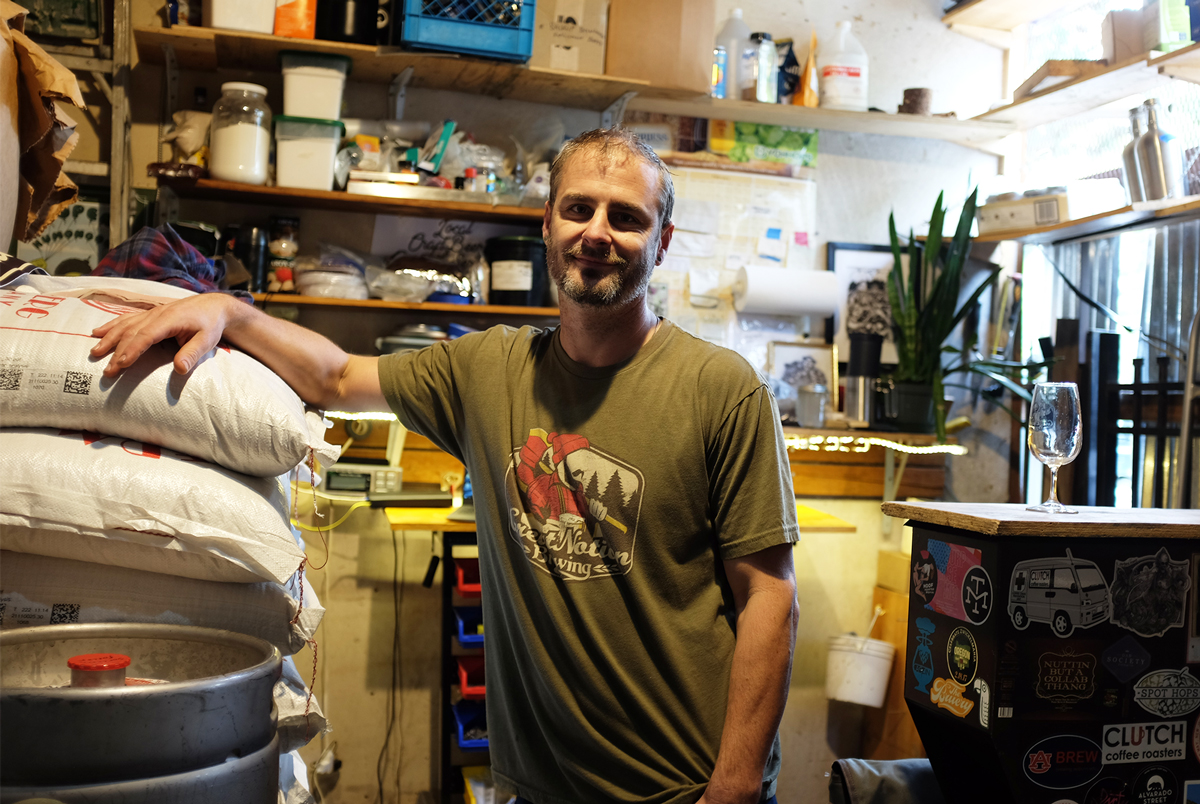
JD: So Andy and I live literally across the street from each other, and Paul is just down the street. The story goes like this: Andy and I were outside my house on a nice summer day. We were drinking our homebrews.
AM: This is a little later, obviously, than the first story.
JD: Yeah. And Paul walks by and he’s like, “Hey, what are you guys doing?” I didn’t know Paul really well at that point but we’d met. We pour him a beer and he’s like, “Damn. This shit is crazy man, why aren’t you guys selling this?” And that’s the thing that every homebrewer hears. It’s a hard question, because you want to be selling it. It’s generally very difficult to do that. Pulling off the financing to open a brewery isn’t easy. So jokingly, we said to Paul, “Can you help us get some capital?” And he was like, “Yeah.” And he wasn’t kidding. Fast forward a few months and Paul came out of the bank with a fat SBA loan.
AM: Like, a week after we’d talked to him, he’d already talked to some potential investors. He was like, “Dude, I got some investors, I’m ready to go.” Honestly, it was like a week. We weren’t even serious at that point.
PR: We started meeting every Wednesday. It’s cool, because we live on the same block. Every Wednesday night we’d put our kids to bed and we’d walk down to the local bar and have our business meetings. So I still had a day job, and the CEO of my old job is an investor in Great Notion. He was fully supportive and that’s cool.
AM: One thing… James and I were homebrewing and kicking ideas back and forth for a long time. Over the couple years it took to do this, we had this block party once a year. They’d buy beer, and all the neighbors would get together and close off the street. It kind of turned into a thing where James and I would brew a different beer and debut it at this block party. We did it every year, and that’s where we met Paul as well. At least, I think that’s where we became close with Paul.
PR: Yeah dude. Your beer was so good.
JD: I think it took over a year to find our first location. Part of it was the cannabis industry blowing up. Warehouses were disappearing. We were having a hard time finding a location, and again Paul came through for us. He knew a friend of a friend and got word that the dude who owned our current location — The Mash Tun — was looking to get out of the business. He wanted to sell and get into a different industry. So Paul called him up, and was like, “Yo, we’re trying to find a location.” We set up a meeting at a McMenamins, and we sat down and he agreed to sell us the spot.
PR: No, we met here, dude.
JD: No, we didn’t.
AM: Yeah, we did. We sat right at the bar over there.
PR: I think one time we did go up there, but that first meeting was here. Either way, we really lucked out. It was an existing brewpub. Lots of breweries that want to open, there’s a long time they have to wait. Like, our new place has taken two fucking years to open. This place was never closed. The former ownership sold us the business, and this place was open the next day. It was business as normal. People were still buying shitty beer and eating shitty food, but we never had to close.
JD: We had a long wait for TTB. How long was it, Andy?
AM: It was like five months, six months.
JD: So during that time, we had the opportunity to fix this place up. It really needed a lot of love.
AM: We bought it July 27th, 2015, and then that day it was Great Notion but we still had the Mash Tun signs. We couldn’t brew again until…
JD: January 1st.
AM: Well, that was when we released the beer, but I think we brewed early December.
PR: So we ran it like a high-end beer bar for six months, and then January 1st, 2016, is when we flipped the sign.
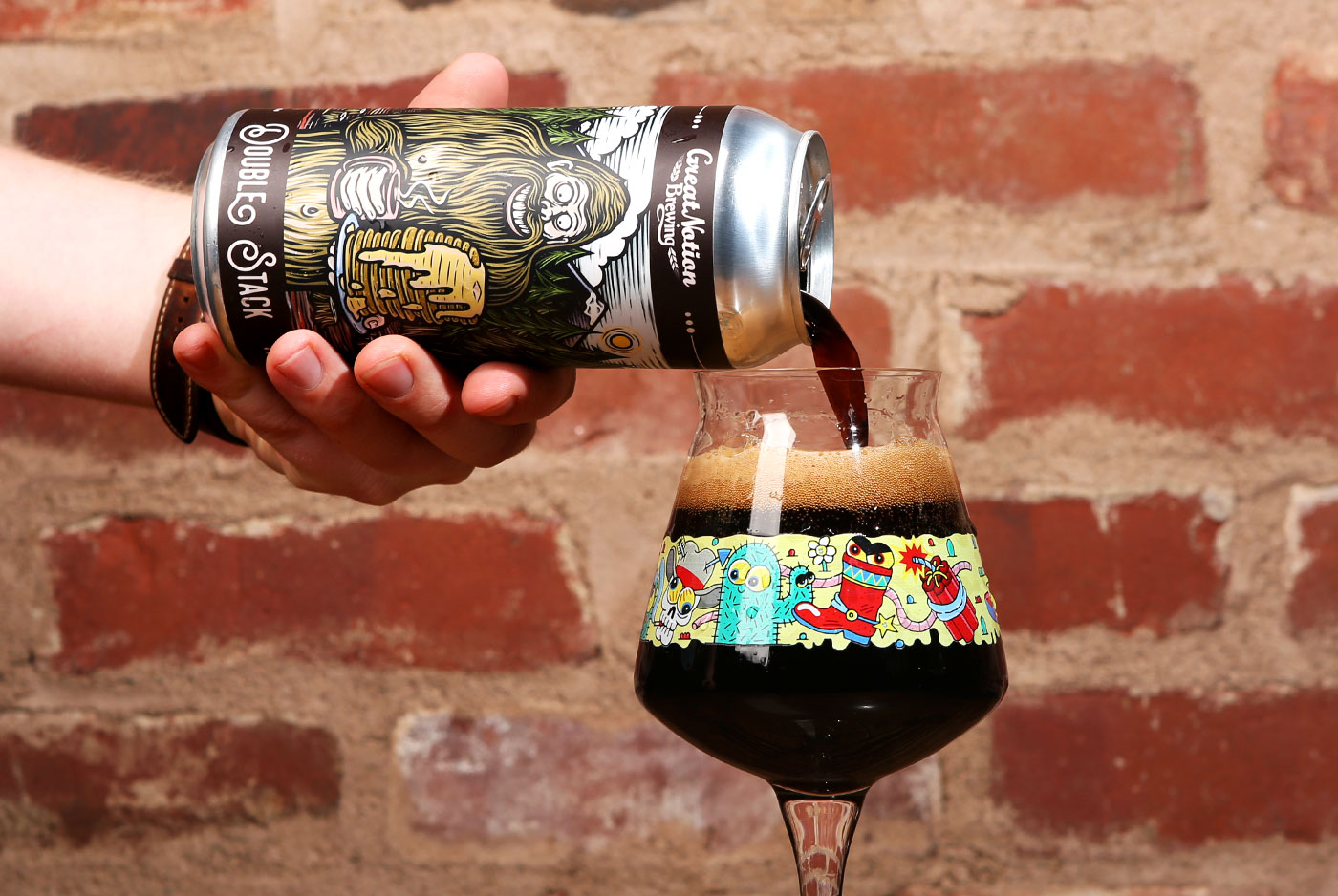
KG: How’d you settle on the name Great Notion?
AM: Well, we went back and forth on a lot of different names. Nothing stuck. My wife suggested the name and we were all like, huh. That’s it.
PR: It comes from Sometimes a Great Notion, a famous Oregon novel about the logging industry. It just had Oregon’s culture at heart.
JD: And it’s written by Ken Kesey, who had ties to the Grateful Dead and the psychedelic community, which resonates with me.
AM: I’d say that even before that though, it comes from an old folk song. “Sometimes you get a great notion to jump in the river and drown.” Goodnight Irene. Some of the Nirvana songs were covers of Lead Belly. I don’t think Nirvana actually covered that song, but that’s a Lead Belly song.
JD: It’s hard to find a brewery name. What we realized through our attorney was that if there’s been a beer named something, you can’t name your brewery that. If you go on Untappd, you’ll see how many names there are. Every time you come up with a new name, you think, “I bet no one has this.” Of course they do!
KG: What was this place almost called?
AM: I think one of our first names was Totem. I still get mail, because we started an LLC I think under that name and I still get junk mail.
JD: So there’s another Northwest brewery that has the same type of imagery and I think they have a beer called Totem Pale Ale. So we talked to them about using that name and they said no. You can’t use that.
AM: You wanted to…
JD: Seahorse.
AM: Yeah, Seahorse! Can you imagine?
JD: Male seahorses raise their own children, and both Andy and I were stay-at-home dads.
AM: I wasn’t feeling that one. I’m glad we didn’t end up with that one.
KG: If you had to describe Great Notion to someone, what would you say?
AM: I think it comes back to the core values.
PR: Family, creativity, and quality. Those are our core values as a company.
JD: All decisions come back to that. We think, that ingredient is really expensive, should we spend the money on that? Quality. You gotta throw down for good quality. Creativity, we always strive to push the boundaries. Family, we all have families, and we strive to nurture that environment. We want people to come here with their families and have a good time. We want our employees to feel like they’re part of a family.
KG: Setting Core Values for a business sounds like something you’d read in a book on entrepreneurship. Where’d that come from?
PR: I got my MBA. I read my fair share of business books.
KG: So you’re the business guy. What are the other roles within the company?
PR: James runs the Alberta Street Brewpub here and keeps our recipes fresh and innovative. He’s always playing with new ingredients and new processes. Andy runs our production brewery. We have a new 30 barrel brewhouse and canning line. I handle marketing, sales, and finance, operations, technology, and everything else. You gotta hire great people and delegate. So we built a team to handle a lot of our other activities. We just hired our first finance / accounting guy, and we just hired a marketing person that’s doing killer photography and Instagram work for us. We have Ryan who was James’ good friend from back when they worked in the music industry together, and he was our chef, and now he runs our restaurant operations.
KG: The beer is pretty unique. What defines the beer and where do you look for inspiration?
JD: Probably the culinary world, in that a lot of our beers are based on foods. You’re drinking a chocolate cream puff right now, which was a blend of a chocolate stout and an IPA that had pandan in it. Pandan is this super custardy Southeast Asian fruit. At the local grocery store, they got us like 10 pounds of these pandan leaves. If you look at a lot of our adjunct beers, they’re inspired by food. Desserts, for the most part.
PR: That’s our little description on Instagram. We focus on hazy IPAs and culinary-inspired sours and stouts.
AM: I think a lot of our inspiration also comes from our homebrewing background where we could play around and just have fun. You don’t necessarily have to make one thing over and over again and sell it to the masses. We’ve tried to bring that spirit into the commercial setting and still enjoy what we’re doing.
JD: Just going off of what Andy was saying, when you homebrew you can experiment like crazy and come up with crazy stuff, but when you work in a commercial setting, there’s a lot on the line. As a brewer, your management has to trust you, especially if you don’t own the place. If you take a chance and something doesn’t work out, that’s a pretty significant loss. But I think that’s one thing we pride ourselves on. We’re totally willing to roll the dice and see what happens with new ingredients and new flavors.
PR: And it’s cool that we have our new place. This is a seven-barrel brewhouse. We can play around here. Those beers might be a flop, and we won’t can those.
AM: There was a time too that the amount of beer we had… we fucked up a seven-barrel batch, we were out of here. So we couldn’t really experiment as much as we wanted to. The new location has really freed things up.
JD: So here at the Alberta location, we come up with new recipes and with things that go over really well here, Andy and I will work together and he’ll scale it up, manage the production of it, and put it in cans. Chad Eaton, who’s our incredible can artist, when we really like something we’ll reach out to him and he’ll draw something for us and that’s a fun process as well.
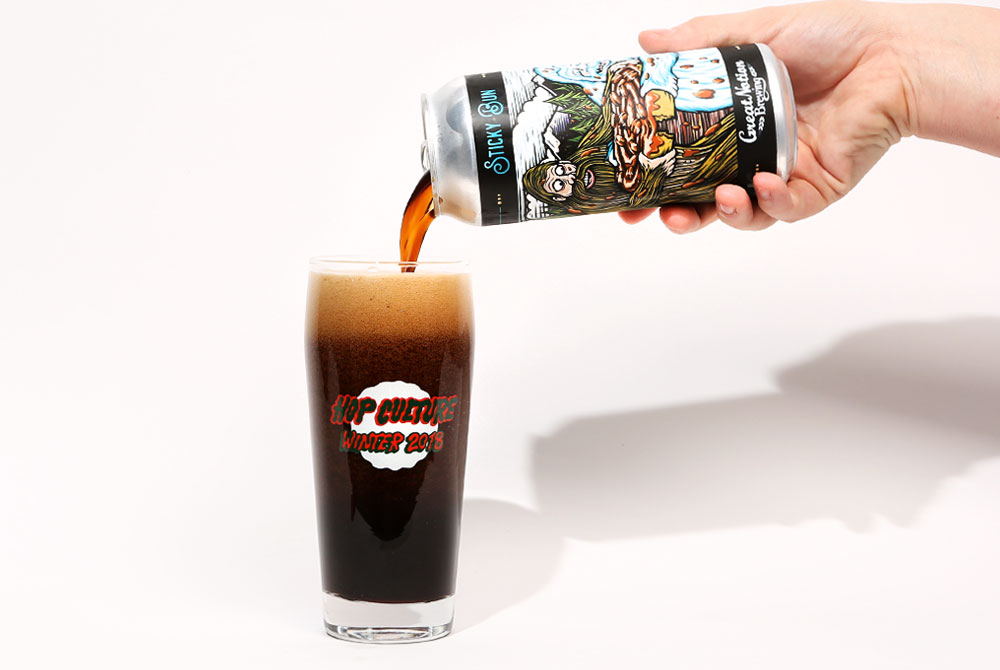
KG: Where are you all from?
PR: Philly.
AM: Alabama.
JD: Philly, as well.
KG: But you guys didn’t know each other? Even though you were both in the music industry?
PR: Different styles. I ran a record label for six years. It sounds weird, but I used to rap. This is… I’m talking 1998 to 2004.
JD: He’s being modest. He was on stage with Digable Planets.
PR: I did open up for a lot of people. I freestyled with Eminem at one point. That was probably my biggest claim to fame. We’ve had our music played on MTV’s Real World. We toured Europe twice.
AM: He raps at our Christmas Party.
JD: I got into the music scene because I don’t have a lot of good music skills, but I love music. I got in as a DJ in the mid 90s to late 2000s. Turntables, and I was involved in the rave scene and electronic music. Then I went to school for sound arts and got a degree in recording. I started working with a band who was a couple good friends of mine, and we were throwing these warehouse parties with visual artists, kind of channeling the Acid Tests of the Kesey time period. I won’t say anymore about that. Our band, the Moodoculators, got pretty popular in the Bay Area. We were having these big parties and then our bass player, Ryan, fell in love with a girl from Portland and moved up here. To keep the music project together, we all moved to Portland. Basically, as soon as we got up here, all our girlfriends and significant others were pregnant and the music project ended. But then I met these guys. And as it turns out, Ryan, who convinced me to move here, is now our restaurant director.
KG: Andy, what’s your background?
AM: I was going to Auburn University and took an internship for landscape horticulture on the West Coast that I thought would be close to my friends in San Diego and it was here in Portland, Oregon. I figured out it was really far from San Diego, but I loved the area. I went home, missed it, and wanted to come back. I came back in 2000 and I’ve been here ever since. I was working for a landscape company and I left to follow a guy who was starting his own thing. I worked there for a number of years until my first son was born, and then I became a stay-at-home dad. I was homebrewing more and more, and that’s how this started.
JD: Life’s so interesting, right? If we all hadn’t ended up moving onto the same street, Great Notion wouldn’t exist. But somehow that happened and it’s a trip. I’m pretty sure I wouldn’t have opened a brewery if not for these guys.
AM: I mean, James and I were talking about opening a brewery but we never could’ve made it work without Paul. We would’ve been some three-barrel brewery named Totem or Seahorse with no money.

